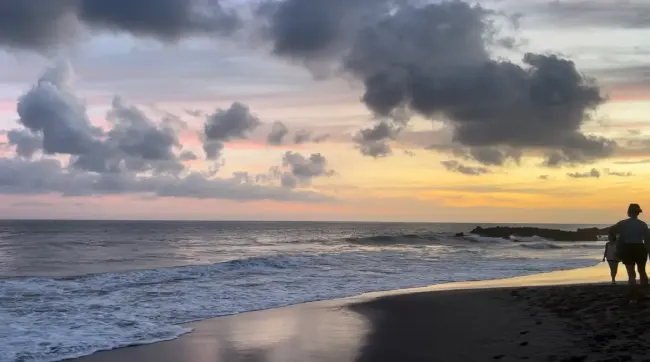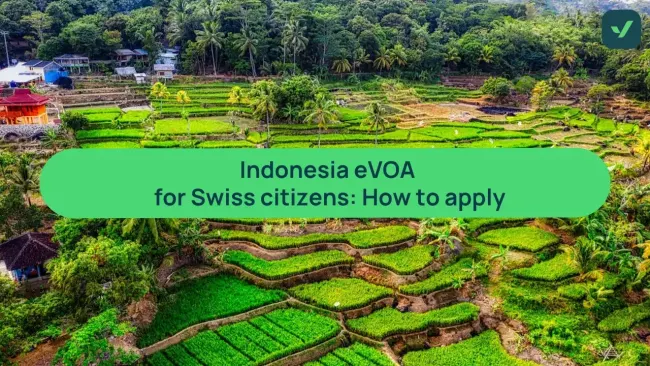
Indonesia
Welcome to Indonesia
Traveling to Indonesia? You may need a visa – find out if you do, which type, and how to apply so you can get the paperwork out of the way and focus on your trip.

What’s an Indonesia eVOA and who’s it for?
Who’s the Indonesian eVOA (Electronic Visa on Arrival) for? The eVOA is accessible to citizens of numerous countries, reflecting Indonesia's wide appeal as a global tourist destination. With this online application you won’t have to stand in the queue on arrival, as you’ll get your pre-approval and make the payment online.
Who’s not eligible for an Indonesian eVOA?
- Travelers from ASEAN member countries do not need a visa for Indonesia, including Thailand, Singapore, the Philippines, Cambodia, Brunei, Malaysia, Myanmar, Laos, and Vietnam.
What’s the purpose of an Indonesian eVOA? The Indonesia eVoa allows you to do many different activities with this visa:
-
Tourism.
-
Government visits.
-
Attend business meetings.
-
Purchase goods.
-
Transit in Indonesia.
However, you are not allowed to work in Indonesia on this visa or attend events as a paid speaker.
How long can you stay with an Indonesian eVOA? The Indonesia eVOA is initially valid for 30 days. It can be extended for another 30 days before its expiry date.
What’s an Indonesia B211A Visa (Tourist Visa) and who’s it for?
Who’s the Indonesian B211A Visa for? Anyone who isn’t eligible to get a Visa on Arrival or eVOA, must apply for this visa to visit Indonesia.
What’s the purpose of an Indonesian B211A Visa? Tourism or business.
How long can you stay with an Indonesian B211A Visa?
Once approved, you have 90 days to enter Indonesia from the visa issuance date, and you can stay in the country for up to 60 days per entry.
What’s an Indonesia Business Visa D2 and who’s it for?

Who’s the Indonesian Business Visa D2 for?
Foreign nationals who intend to engage in business activities in Indonesia.
What’s the purpose of an Indonesia Business Visa D2? Participating in meetings and negotiations, signing business contracts, buying items - which may involve inspecting them at an office, factory, or where they are made - tourist activities, and visiting family and friends.
How long can you stay with an Indonesia Business Visa D2? It’s valid for 1 year after arrival. It’s a Multiple entry visa, and you can stay up to 60 days per entry.
Learn more about the Indonesia Business Visa D2
What’s an Indonesia Electronic Customs Declaration and who’s it for?
Who’s the Indonesian Electronic Customs Declaration for?
All passengers must complete a customs declaration before arrival in Indonesia. (only one declaration per family is required).
How long can you stay with an Indonesian Electronic Customs Declaration?
You can only use this document once when you enter the country.
Learn more about the Indonesia Electronic Customs Declaration
What are the Indonesian long-term visa options?

Indonesia offers several long-term visa options for various purposes, such as employment, study, business, and residence. Here are some of the common long-term visas:
-
Multiple-entry visas: Suitable for individuals who need to enter Indonesia several times for official government, business, or commercial activities, as well as family visits.
-
Business visas: A Multiple entry visa for business-related activities (excluding employment), valid for up to 1 year after arrival with stays of up to 60 days per entry.
-
Limited-stay visas (KITAS): Designed for those intending to reside in Indonesia for longer periods for reasons such as work, study, family reunification, or retirement.
-
Diplomatic and service visas: For diplomats and officials involved in governmental activities.
At iVisa, we currently don’t offer these visas, but you can find out more from the nearest Indonesian Embassy or Consulate.
Staying healthy in Indonesia: Here’s what you need to know
Healthcare facilities and standards in Indonesia can vary significantly depending on the location and the type of facility. Here's what travelers should know.
Make sure to stay updated on routine vaccines
-
Consider vaccines for diseases like chickenpox, diphtheria-tetanus-pertussis, flu, measles-mumps-rubella (MMR), polio, and shingles.
-
A yellow fever vaccination certificate is required from travelers aged 9 months and over arriving within 6 days of departure from an area with a risk of yellow fever transmission.
-
Keep updated with Indonesia's COVID-19 requirements, such as quarantine, testing, or vaccine certificates, through your airline or the Indonesian government website.
Medical facilities
In urban areas, private hospitals and specialized centers usually offer high-quality healthcare services. These are also the ones mostly used for medical tourism.
-
In major cities like Jakarta, Bali, and Surabaya, you'll find private hospitals offering a higher standard of care, often on par with Western facilities. These hospitals cater well to international travelers, with English-speaking staff.
-
In Rural areas or smaller islands, medical facilities can be basic. In these regions, clinics may lack advanced equipment or specialized care.
Health insurance
We’d always recommend taking out health insurance before you travel anywhere from any destination.
All the major cities in Indonesia will have private medical care, but it’s expensive. You should choose travel insurance with high medical limits.
Contact your insurance provider before traveling to make sure you have the right level of coverage.
Other things to consider:
-
Trip cancellation, delay, and interruption benefits.
-
Medical expenses and medical evacuation benefits.
-
Baggage coverage.
Things to be aware of when visiting Indonesia
Keep an extra eye on the following to keep healthy and safe during your trip to Indonesia:
1. Food and water contamination: Drink only bottled water and avoid tap water.
2. Mosquito-borne diseases: Dengue fever and malaria are prevalent in Indonesia. Protecting yourself with repellents, wearing long-sleeved clothing, and staying in accommodations with mosquito nets are advisable.
3. Water activities: Indonesia's stunning beaches and marine life are irresistible, but beware of strong currents and riptides when swimming or diving.
Medication for personal use
Follow these tips to bring into Indonesia some over-the-counter medicines:
-
Declare all medications: Report all medication for personal use to customs authorities.
-
Original packaging: Always keep medicines in their original containers and in transparent bags in your hand luggage.
-
Prescription or doctor's letter: Present the medical prescription issued by your doctor or other competent authority, in English.
-
Check for restrictions: Call Indonesia's embassy to verify that all of your prescription(s) are legal to bring with you.
-
Quantity aligned with itinerary: Bring only a reasonable quantity that aligns with your stay duration to avoid complications.

 Australia ETA Online
Australia ETA Online
 United Kingdom ETA
United Kingdom ETA
 India Tourist eVisa
India Tourist eVisa
 Canada ETA Visa
Canada ETA Visa
 Turkey eVisa
Turkey eVisa
 Egypt eVisa
Egypt eVisa
 Singapore SG Arrival Card
Singapore SG Arrival Card
 Indonesia eVoa Visa
Indonesia eVoa Visa
 Aruba ED Card
Aruba ED Card


